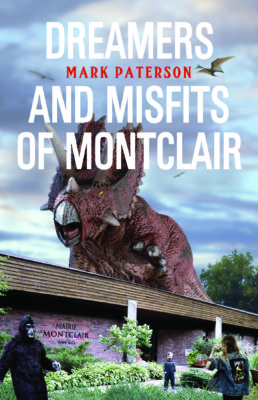Like the characters in Mark Paterson’s Dreamers and Misfits of Montclair, I’m a product of the suburbs. I grew up there, as publicly embarrassed by the place as I was privately enamoured of it. So it’s probably not surprising that I’m sensitive about how suburbia is depicted in fiction, and especially how routinely it’s trash-talked.
And, yes, in his new collection of fourteen short stories, Paterson takes his shots at the usual suspects – the “cookie cutter houses” and “lifeless strip malls,” as well as the inhabitants longing for something more. Montreal, in this case, and while the big city may be only a few exits south on the autoroute it still remains somehow out of reach.
But if Paterson feels obliged to critique the suburbs, you can tell – I can, anyway – his heart isn’t really in it. The homes in these stories may all seem the same, but the lives playing out inside them are plainly not. They’re as unique and intricate as a DNA sample.
In “The Blind Man’s House,” a teenage girl’s obsession with the unfathomable life of a neighbour has her stumbling across a line of propriety. She’s young and curious and just wants to know all those things she has no business knowing.

Dreamers and Misfits of Montclair
Mark Paterson
Exile Editions
$19.95
paper
202pp
9781550968361
Paterson had me, for instance, at the garage sale gorilla suit – on the first page of the first story, that is. In “Salut King Kong,” a sixteen-year-old climbs into a second-hand costume and sets out for a nearby fast food drive-thru to flirt with a girl he likes and who just might like him back. He’s abuzz at this wonderfully implausible opportunity. “I’d never felt so vibrant in all my life,” he thinks, looking out through his newly acquired, rank-smelling mask.
Throughout this collection, the sweet and bitter, the ordinary and odd commingle. Paterson provides us with a lovingly resolute reminder that even in the suburbs, anything – like requited love, courtesy of a gorilla suit – is possible.
In “What Have You Done?,” the narrator regrets lying about his sexual exploits. It turns out his dream of a world of “endless possibilities” isn’t everything it’s cracked up to be.
Dreamers and Misfits of Montclair is Paterson’s third short story collection, and it demonstrates his ease with the form’s range. “Salut King Kong” is a quick hit – quirky and to the point. Even quicker and quirkier are postcard pieces like “Body Noises with the Door Open” and “Spring Training.”
But it’s in the longer, more reflective narratives that Paterson is at his best – wrestling with his characters’ mixed feelings about who they are, where they come from, and how the two questions invariably collide. Often, Paterson’s protagonists end up surprising themselves. In “Psychic Radio,” an obnoxious kid is forced to stick up for the nerdy younger brother he’s spent most of the story desperate to ignore.
Another kid on the verge of manhood comes to a mundane but nonetheless astonishing realization in “Stinky Up a Tree.” He won’t be stuck in this same place forever:
He steps inside the house, but stops in the vestibule: an unanticipated thought has formed in his head. He stares at the floor beneath him, and at his feet. For the first time, he understands that a day will come when those feet will carry him across the same threshold but in the opposite direction, for good.
Of course, it’s easy to imagine this young man also understanding, one day, that he didn’t really get away for good. It’s easy to imagine him, like the author of these stories, like many of us, recalling his time in Montclair, or a place resembling it, with insight and compassion. mRb






0 Comments